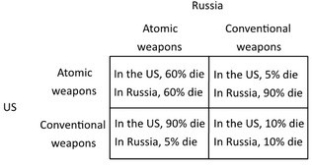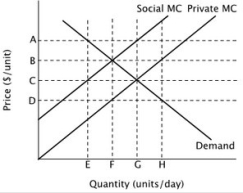A) The cigar smoker will not be able to smoke because the majority of people in the room dislike the smell of cigar smoke.
B) The cigar smoker will pay each of the other nine people fifty-five cents, and they will agree to allow smoking.
C) The cigar smoker will smoke because the external cost of smoking does not need to be taken into consideration.
D) The nine non-smokers will each pay the cigar smoker fifty cents and the cigar smoker will not smoke.
F) C) and D)
Correct Answer

verified
Correct Answer
verified
Multiple Choice
Suppose there are three power-generating plants, each of which has access to 5 different production processes. The table below summarizes the cost of each production process and the corresponding number of tons of smoke emitted each.  It would cost Firm X ________ to reduce emissions by one ton if it currently emits 3 tons, and ________ to reduce emissions by one ton if it currently emits 2 tons.
It would cost Firm X ________ to reduce emissions by one ton if it currently emits 3 tons, and ________ to reduce emissions by one ton if it currently emits 2 tons.
A) $14; $25
B) $14; $16
C) $16; $25
D) $30; $55
F) A) and D)
Correct Answer

verified
Correct Answer
verified
Multiple Choice
Two companies, Dirty Inc. and Filthy Inc., each of which has access to 5 different production processes, each of which has a different cost and produces a different amount of pollution. The daily costs of the processes and the number of tons of smoke emitted are shown in the table below.  Suppose pollution is initially unregulated. If the City Council imposes a tax of $91 per day on each ton of smoke emitted, then what will be the total cost to society of the resulting reduction in pollution?
Suppose pollution is initially unregulated. If the City Council imposes a tax of $91 per day on each ton of smoke emitted, then what will be the total cost to society of the resulting reduction in pollution?
A) $90
B) $180
C) $270
D) $360
F) A) and D)
Correct Answer

verified
Correct Answer
verified
Multiple Choice
Curly and Moe are considering living alone or being roommates and splitting the rent for the next twelve months. If they live alone, they each rent a one bedroom, one bath apartment for $500 per month, while if they are roommates, they can split a two bedroom, one bath apartment for $800 per month. The one difficulty they have is that Moe snores very loudly. Curly estimates the cost of poor sleep due to Moe's snoring at $150 per month. Moe could obtain a snore-eliminating device for $50 per month. The least costly solution to the externality present in this situation is for:
A) Curly to endure Moe's snoring.
B) both to live alone.
C) Moe to eliminate his snoring.
D) Moe to pay Curly for his discomfort.
F) A) and C)
Correct Answer

verified
Correct Answer
verified
Multiple Choice
The essential cause of the tragedy of the commons is the fact that:
A) it can be difficult to solve the free-rider problem.
B) one person's use of a commonly held resource imposes an external cost on others.
C) when a resource has no price, it leads to a positional externality.
D) governments may not tax activities that generate negative externalities.
F) A) and C)
Correct Answer

verified
Correct Answer
verified
Multiple Choice
Suppose Oscar and Felix share an apartment. Oscar likes to leave his dirty dishes in the sink, and this really bothers Felix. When Oscar leaves his dirty dishes in the sink, Oscar's surplus from their living arrangement is $400 per month, and Felix's surplus is $300 per month. On the other hand, when Oscar does not leave his dirty dishes in the sink, Oscar's surplus from their living arrangement is $350 per month, and Felix's surplus is $325 per month. There are no rules or regulations that prevent Oscar from leaving his dishes in the sink. In this case, the socially optimal outcome can be achieved:
A) if Felix gives Oscar $25 per month to stop leaving his dishes in the sink.
B) if Felix gives Oscar $50 per month to stop leaving his dishes in the sink.
C) if Felix gives Oscar more than $75 per month to stop leaving his dishes in the sink.
D) without any intervention.
F) A) and C)
Correct Answer

verified
Correct Answer
verified
Multiple Choice
A cost of an activity that falls on people not engaged in the activity is called a(n) :
A) external benefit.
B) prisoner's dilemma.
C) negative externality.
D) positive externality.
F) None of the above
Correct Answer

verified
Correct Answer
verified
Multiple Choice
Numerous studies have shown that breathing second-hand cigarette smoke is harmful to your health. This suggests that a tax on cigarettes will:
A) increase total economic surplus.
B) decrease total economic surplus.
C) have no effect on total economic surplus.
D) lead to a decrease in the price of cigarettes.
F) A) and B)
Correct Answer

verified
Correct Answer
verified
Multiple Choice
If the marginal cost of pollution abatement is smaller for large firms than it is for small firms, then it is efficient for:
A) small firms to reduce pollution by more than large firms.
B) small firms and large firms to reduce pollution by a fixed proportion.
C) small firms and large firms to increase pollution by a fixed proportion.
D) large firms to reduce pollution by more than small firms.
F) C) and D)
Correct Answer

verified
Correct Answer
verified
Multiple Choice
If the marginal cost of pollution abatement differs across firms, then regulations that require all polluters to reduce pollution by a fixed proportion will be:
A) efficient.
B) inefficient
C) ineffective.
D) fair to all polluters.
F) B) and D)
Correct Answer

verified
Correct Answer
verified
Multiple Choice
The following payoff matrix shows the outcomes for the United States and Russia from relying on conventional weapons versus atomic weapons in a military conflict. The percentages refer to the fraction of the population that would die.  This situation above illustrates a positional externality because:
This situation above illustrates a positional externality because:
A) using atomic weapons is a dominated strategy.
B) using atomic weapons improves each country's outcome but hurts the other country.
C) the game does not have a Nash equilibrium.
D) no matter what kind of weapons each country chooses, many people will die.
F) B) and C)
Correct Answer

verified
Correct Answer
verified
Multiple Choice
A policy maker has argued for higher taxes on gasoline to reduce the negative externalities associated with driving. This policy will lead to a relatively ________ reduction in driving if demand is ________.
A) small; perfectly elastic
B) large; perfectly inelastic
C) small; relatively inelastic
D) large; relatively inelastic
F) B) and D)
Correct Answer

verified
Correct Answer
verified
Multiple Choice
Carmen listens to opera music every evening when she gets home from work. Carmen loves listening to opera, but her neighbor Paul, who can also hear the music, hates it. If Paul is the only person besides Carmen who can hear the music, then Carmen's music generates:
A) a negative externality.
B) a positive externality.
C) neither a positive nor a negative externality.
D) both a positive and a negative externality.
F) All of the above
Correct Answer

verified
Correct Answer
verified
Multiple Choice
Refer to the figure below. At the private market equilibrium quantity, the social marginal cost of the last unit produced is ________ the marginal benefit of the last unit produced. 
A) equal to
B) greater than
C) less than
D) less important than
F) None of the above
Correct Answer

verified
Correct Answer
verified
Multiple Choice
Two firms, Acme and FirmCo, have access to five production processes, each of which has a different cost and gives off a different amount of pollution. The daily costs of the processes and the corresponding number of tons of smoke emitted are shown in the table below.  Suppose the firms are both currently using process A. If the government imposes a tax of $110 per ton of smoke emitted, a total of ________ tons of smoke will be emitted each day, and the total cost to society of this policy will be ________ per day.
Suppose the firms are both currently using process A. If the government imposes a tax of $110 per ton of smoke emitted, a total of ________ tons of smoke will be emitted each day, and the total cost to society of this policy will be ________ per day.
A) 14; $500
B) 16; $250
C) 18; $50
D) 20; $0
F) All of the above
Correct Answer

verified
Correct Answer
verified
Multiple Choice
According to the textbook, social norms:
A) are usually ignored.
B) are a type of positional externality.
C) can help curtail positional arms races.
D) are never effective at limiting positional arms races.
F) A) and C)
Correct Answer

verified
Correct Answer
verified
Multiple Choice
The following data show the relationship between the number of drivers who leave for work at 8 a.m., their average commute time, and their marginal benefit of commuting. If there is no charge to use the highway, then one would expect that ________ than the socially optimal number of drivers will leave at 8 a.m. because ________.
A) more; each driver's use of the highway imposes an external cost on other drivers by increasing the commute time
B) more; the social marginal benefit of using the highway is greater than the private marginal benefit
C) less; each driver's use of the highway imposes an external cost on other drivers by increasing the commute time
D) less; the private marginal benefit of using the highway is greater than the social marginal benefit
F) B) and C)
Correct Answer

verified
Correct Answer
verified
Multiple Choice
Which one of the following government actions is intended to generate positive externalities?
A) Taxing polluting industries
B) Speed limits on the highways
C) Requiring autos to meet minimum emissions regulations
D) Subsidies for planting trees on hillsides
F) B) and D)
Correct Answer

verified
Correct Answer
verified
Multiple Choice
Which of the following is an example of a positional arms control agreement?
A) Campaign spending limits
B) Highly selective admissions standards at colleges
C) Prohibiting speech that causes more harm than good
D) Public education
F) None of the above
Correct Answer

verified
Correct Answer
verified
Multiple Choice
The Coase theorem implies that the initial allocation of property rights:
A) determines all aspects of the final outcome of the negotiated agreement.
B) does not determine which person will be entitled to engage in the externality generating activity, but does determine which person will receive compensation.
C) determines which person will be entitled to engage in the externality generating activity, but does not affect which person will receive compensation.
D) must be assigned to the person with the greatest costs.
F) A) and D)
Correct Answer

verified
Correct Answer
verified
Showing 21 - 40 of 184
Related Exams